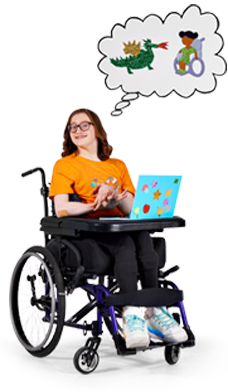IMAGINE YEMINA'S NOVELS ON THE BEST SELLER LIST

Ask Yemina about her favourite book, and she’ll have a hard time deciding between the many stories that line her bookshelves.
The only story that’s missing from those shelves? Representation of characters with disabilities.
That’s something 17 year old Yemina, who has cerebral palsy and uses a wheelchair, plans to change. And Holland Bloorview Kids Rehabilitation Hospital is there to support her, through communication and writing aids, adaptive technology, and even an inclusive summer camp.
We chatted with Yemina about how Holland Bloorview has helped her find her voice, and why we need to create a world where disability is heard.
What kind of books do you like to read?
Yemina: I like a lot of different genres, like fantasy, sci-fi and mystery.
Do any of those books include characters with disabilities?
Yemina: I like the book, A Curse So Dark and Lonely, by Brigid Kemmerer. The main character in that book, Harper, has cerebral palsy. But there needs to be more disability representation.
What kind of books do you want to write?
Yemina: I want to write a fantasy novel with characters who have disabilities.
What are some of your other interests?
Yemina: I like science, especially biology and chemistry. I love the experiments. I also like to travel.
Where have you travelled lately, and where do you want to go next?
Yemina: I’ve travelled to the U.S. and to Israel. I really want to go to Europe, especially France and Italy. They’re only a two hour drive apart. There’s so much to see in that tiny part of the world!
What’s it like travelling as someone who uses a wheelchair?
Yemina: When I’m travelling, I just find the places that are accessible. That’s not the hard part for me. The hard part is getting there because I’m afraid that my wheelchair will break on the plane. Once I travelled with my walker, and it broke. Fortunately, that hasn’t happened to me in a long time.
How do you like to document your travels?
Yemina: I like art, but I can’t really use my hands, so I tell other people what I want to draw. But I imagine inventing something like a drawing robot, or an adaptive glove. There would be a pen on one end, so that it would draw when I moved my hand.
What kinds of adaptive technologies do you use now?
Yemina: I’ve been using speech-to-text software. When I was a kid, I had a very high voice, so it couldn’t understand me because my voice wasn’t in the right range. Now, speech-to-text is easier to use, but still, if I ask it to type a long sentence, I have to rearrange the words. I imagine it would be helpful if the software learned how I spoke and adapted to me.
How has Holland Bloorview helped you put adaptive technology to use?
Yemina: I go to the communication and writing aids service, and I’ve been a part of a lot of studies at the Bloorview Research Institute. I once participated in a study about an adaptive technology that helped me read books on my computer. When I clicked a button, the computer turned the page for me.
How else has Holland Bloorview helped you imagine new possibilities?
Yemina: Holland Bloorview has helped me do things I couldn’t otherwise do. For example, when I was younger, I went to this summer camp through Holland Bloorview and we went rock-climbing and dragon-boating. It was amazing!
How Holland Bloorview imagines a world where disability is heard:
Imagine technology that allows kids who have no existing means of communication to speak and interact with the world around them. These technologies aren’t the premise of a science fiction novel. They’re just a few of the assistive technologies developed by the Bloorview Research Institute’s PRISM Lab. At Holland Bloorview, our researchers bring out-of-this-world research to life, changing the future of disability as we know it.
